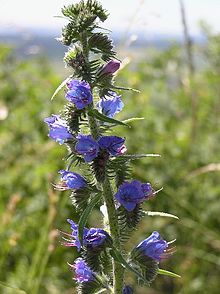Loading AI tools
Genus of flowering plants in the borage family Boraginaceae From Wikipedia, the free encyclopedia
Echium /ˈɛkiəm/[2] is a genus of flowering plants in the family Boraginaceae that contains about 70 species and several subspecies.
| Echium | |
|---|---|
 | |
| Echium vulgare | |
| Scientific classification | |
| Kingdom: | Plantae |
| Clade: | Tracheophytes |
| Clade: | Angiosperms |
| Clade: | Eudicots |
| Clade: | Asterids |
| Order: | Boraginales |
| Family: | Boraginaceae |
| Subfamily: | Boraginoideae |
| Genus: | Echium Tourn. ex L. (1753) |
| Type species | |
| Echium vulgare | |
| Species[1] | |
|
68; see text | |
| Synonyms[1] | |
| |







Species of Echium are native to North Africa, mainland Europe to Central Asia, and the Macaronesian islands where the genus reaches its maximum diversity. Twenty-nine species of Echium are endemic to the Canary, Madeira, and Cape Verde archipelagos.[3] The continental species are herbaceous, whereas many of the endemic species of the Macaronesian islands are woody perennial shrubs.[4]
The Latin genus name Echium comes from the Greek ἔχιον echion, referring to Echium plantagineum[5] and itself deriving from ἔχις echis (viper); the Greek term dates to Dioscorides, who noted a resemblance between the shape of the nutlets and a viper's head.[6] The genus Echium was published by Carl Linnaeus in 1753.
Many species are used as ornamental and garden plants and may be found in suitable climates throughout the world.[1] In Crete, Echium italicum is called pateroi (πάτεροι) or voidoglosses (βοϊδόγλωσσες) and its tender shoots are eaten boiled or steamed.[7]
Echium species are used as food plants by the larvae of some Lepidoptera species including Coleophora onosmella and orange swift.
In some countries Echium extract has been used as cure for various diseases and is believed to have beneficial properties.
The seed oil from E. plantagineum contains high levels of alpha-linolenic acid (ALA), gamma-linolenic acid, and stearidonic acid, making it valuable in cosmetic and skin-care applications, with further potential as a functional food, as an alternative to fish oils.[8] However, despite its high ALA content, Echium seed oil does not increase docosahexaenoic acid and eicosapentaenoic acid levels.[9]
Some species have been widely naturalized in Mediterranean climates, including South Africa, Australia, New Zealand, and parts of South America and the United States. For example, Echium plantagineum has become a major invasive species in Australia.[10]
68 species are accepted.[1]
Seamless Wikipedia browsing. On steroids.
Every time you click a link to Wikipedia, Wiktionary or Wikiquote in your browser's search results, it will show the modern Wikiwand interface.
Wikiwand extension is a five stars, simple, with minimum permission required to keep your browsing private, safe and transparent.